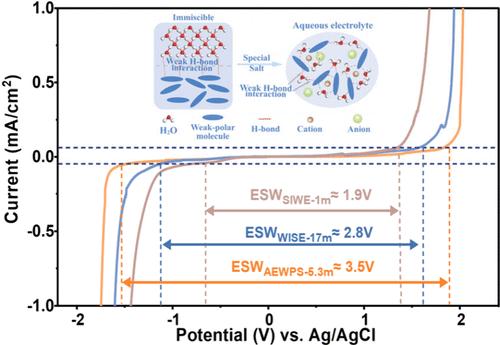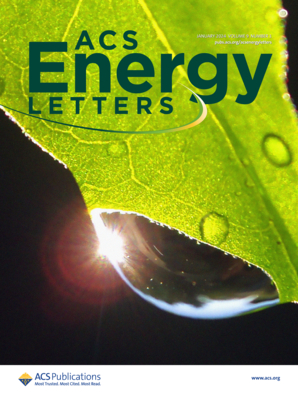A Low-Concentrated Electrolyte with a 3.5 V Electrochemical Stability Window, Made by Restructuring the H-Bond Network, for High-Energy and Long-Life Aqueous Sodium-Ion Batteries
IF 19.3
1区 材料科学
Q1 CHEMISTRY, PHYSICAL
引用次数: 0
Abstract
The narrow electrochemical stability window (ESW) of electrolytes is primarily responsible for the low energy density and poor cycle life of aqueous sodium-ion batteries (ASIBs). Although water-in-salt electrolytes can effectively widen the ESW, their high salt concentration leads to high costs. In this work, we found that weak-polar solvents have more advantages in broadening the ESW than strong-polar solvents. Taking 1,3,6-hexanetricarbonitrile as an example, it evidently enhances the stability of water by weakening the hydrogen bond network. Consequently, it broadens the ESW to 3.5 V at a relatively low concentration and enables Na2FeFe(CN)6||NaTi2(PO4)3 full cells with a capacity retention of 70% after 10 000 cycles and an energy density of 71 Wh kg–1, based on the active materials’ mass of both electrodes. This work offers new prospects for the development of high-energy and long-life aqueous sodium-ion batteries for large-scale energy storage.

求助全文
约1分钟内获得全文
求助全文
来源期刊

ACS Energy Letters
Energy-Renewable Energy, Sustainability and the Environment
CiteScore
31.20
自引率
5.00%
发文量
469
审稿时长
1 months
期刊介绍:
ACS Energy Letters is a monthly journal that publishes papers reporting new scientific advances in energy research. The journal focuses on topics that are of interest to scientists working in the fundamental and applied sciences. Rapid publication is a central criterion for acceptance, and the journal is known for its quick publication times, with an average of 4-6 weeks from submission to web publication in As Soon As Publishable format.
ACS Energy Letters is ranked as the number one journal in the Web of Science Electrochemistry category. It also ranks within the top 10 journals for Physical Chemistry, Energy & Fuels, and Nanoscience & Nanotechnology.
The journal offers several types of articles, including Letters, Energy Express, Perspectives, Reviews, Editorials, Viewpoints and Energy Focus. Additionally, authors have the option to submit videos that summarize or support the information presented in a Perspective or Review article, which can be highlighted on the journal's website. ACS Energy Letters is abstracted and indexed in Chemical Abstracts Service/SciFinder, EBSCO-summon, PubMed, Web of Science, Scopus and Portico.
 求助内容:
求助内容: 应助结果提醒方式:
应助结果提醒方式:


